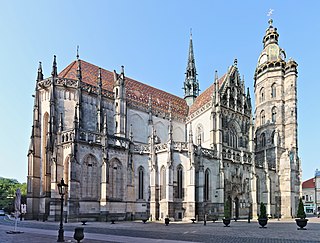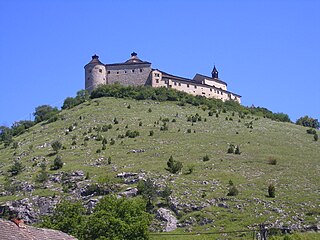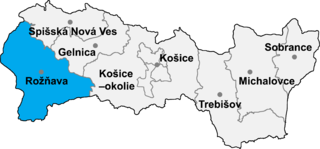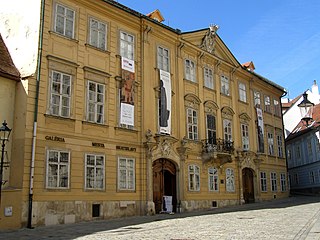
Košice is the largest city in eastern Slovakia. It is situated on the river Hornád at the eastern reaches of the Slovak Ore Mountains, near the border with Hungary. With a population of approximately 230,000, Košice is the second-largest city in Slovakia, after the capital Bratislava.

Abov is historically the Slovak name of an Abaúj County in the Kingdom of Hungary. Today, it is an informal designation of the part of that county situated in Slovakia, as well as the official name of one of Slovakia's tourist regions. The southern half of the former county is part of modern Hungary.

Prešov is a city in Eastern Slovakia. It is the seat of administrative Prešov Region and Šariš. With a population of approximately 84,000 for the city, and in total about 110,000 with the metropolitan area, it is the third-largest city in Slovakia. It belongs to the Košice-Prešov agglomeration and is the natural cultural, economic, transport and administrative center of the Šariš region. It lends its name to the Eperjes-Tokaj Hill-Chain which was considered as the geographic entity on the first map of Hungary from 1528. There are many tourist attractions in Prešov such as castles, pools and the old town.

Borsod–Abaúj–Zemplén is an administrative county in north-eastern Hungary, on the border with Slovakia. It shares borders with the Hungarian counties Nógrád, Heves, Hajdú–Bihar and Szabolcs–Szatmár–Bereg. The capital of Borsod–Abaúj–Zemplén county is Miskolc. Of the seven statistical regions of Hungary it belongs to the region Northern Hungary.

Abaúj is a historic administrative county (comitatus) of the Kingdom of Hungary. In parts of the 19th century, and in the beginning of the 20th century, it was united with Torna County to form Abaúj-Torna county. Its territory is now in eastern Slovakia and north-eastern Hungary. Today Abaúj and Abov are only informal designations of the corresponding territories in Hungary and Slovakia.

The Cathedral of St. Elizabeth, also called Saint Elizabeth Cathedral, is a Gothic cathedral in Košice, Slovakia. It is the largest church in Slovakia and one of the easternmost Gothic cathedrals in Europe.

The National Gallery Prague, formerly the National Gallery in Prague, is a state-owned art gallery in Prague, which manages the largest collection of art in the Czech Republic and presents masterpieces of Czech and international fine art in permanent and temporary exhibitions. The collections of the gallery are not housed in a single building, but are presented in a number of historic structures within the city of Prague, as well as other places. The largest of the gallery sites is the Trade Fair Palace, which houses the National Gallery's collection of modern art. Other important exhibition spaces are located in the Convent of St Agnes of Bohemia, the Kinský Palace, the Salm Palace, the Schwarzenberg Palace, the Sternberg Palace, and the Wallenstein Riding School. Founded in 1796, it is one of the world's oldest public art galleries and one of the largest museums in Central Europe.

The East Slovak Museum in Košice, Slovakia, is one of the oldest Slovak museums, founded in 1872. It is located in the Old Town borough of Košice, at Námestie maratóncov.

Košice–okolie District is a district in the Košice Region of eastern Slovakia. It surrounds the city of Košice, which serves as the district seat although it does not belong to the district.

Rožňava District is a district in the Košice Region of eastern Slovakia. Until 1918, the district was mostly part of the county of Kingdom of Hungary of Gömör és Kishont, apart from the area in the south-east around the municipalities of Silická Jablonica, Hrušov, Jablonov nad Turňou and Hrhov which formed part of the county of Abaúj-Torna.

Košice I is a district in the Košice Region of eastern Slovakia, in the city of Košice. It is bordered by the Košice II, Košice III, Košice IV and Košice-okolie districts. Until 1918, the district was part of the Hungarian county of Abaúj-Torna.

Košice II is a district in the Košice Region of eastern Slovakia, in the city of Košice. It is bordered by the Košice I, Košice IV and Košice-okolie districts. Until 1920, the district was part of the Hungarian county of Abaúj-Torna.

Košice III is a district in the Košice Region of eastern Slovakia, in the city of Košice. It is bordered by the Košice I, Košice IV and Košice-okolie districts. Until 1918, the district was mostly part of the Hungarian county of Abaúj-Torna.

Košice IV is a district in the Košice Region of eastern Slovakia, in the city of Košice. It is bordered by the Košice I, Košice II, Košice III and Košice-okolie districts. Until 1918, the district was mostly part of the Hungarian county of Abaúj-Torna.

Hrušov is a village and municipality in the Rožňava District in the Košice Region of middle-eastern Slovakia.

Jablonov nad Turňou is a village and municipality in the Rožňava District in the Košice Region of middle-eastern Slovakia.

Silická Jablonica is a village and municipality in the Rožňava District in the Košice Region of middle-eastern Slovakia.
The architecture of Hungary is understood as the architecture of the territory of the country of Hungary, and in a wider, of the Kingdom of Hungary, from the conquest to the present day.

Mirbach Palace is a Baroque-Rococo building in the historical zone of Bratislava, Slovakia. The four-wing, two-story building, which ranks among the most beautiful and best-preserved architectural monuments of the mentioned style period in Slovakia, was named after the last owner, Baron Dr. to Emil Mirbach.

Košice Staré Mesto is a borough of Košice, Slovakia. It encompasses the historical centre of the city, consisting of the medieval and early modern core of Košice, with many preserved historical buildings of several architectural styles, and a small number of more modern architecture. The borough also includes the immediate environs of the historical centre.


















